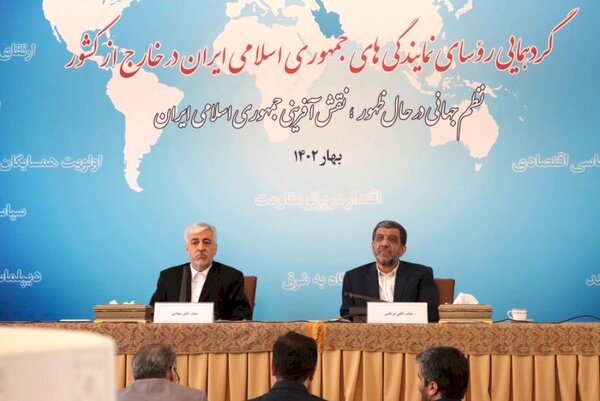Tourism minister calls on ambassadors to fight Iranophobia

TEHRAN – Cultural Heritage, Tourism, and Handicrafts Minister Ezzatollah Zarghami has called on Iranian ambassadors to other countries to help foil anti-Iranian sentiment or Iranophobia that is forged by some Western governments.
“Ambassadors have a historical duty concerning Iranophobia…” Zarghami said on Sunday.
He made the remarks in Tehran during a meeting with envoys to other countries, saying: “[International] tourists [visiting the Islamic Republic] are the best example of countering that Iranophobia.”
“Effective efforts to attract [more] tourists to the country can lead to a change in tourists' view of Iran,” the minister said.
Elsewhere in his remarks, Zarghami considered the ambassadors as the commanders of the front line of the country's diplomacy.
Referring to tourism as the most concrete example of public diplomacy, he added: “A mission of the ambassadors is to introduce Iran to the people of the world and fight Iranophobia and to introduce the country's tourism capacities to the world.”
“Dignity, expediency, and wisdom should be properly understood and implemented through effective approaches according to the specific characteristics of each country.”
Moreover, the ambassadors should assure foreign investors about the stability and profitability of investing in Iran's tourism.
At the end of the meeting, the minister invited the ambassadors to visit the National Museum of Iran, IRNA reported.
Iran still ‘unknown’ to many travelers
Experts say the contribution of tourism and the hospitality industry is an effective tool to foil anti-Iranian sentiments.
“When holidaymakers arrive in Iran, they feel the real face of the country, so tourism is a great instrument to help thwart Iranophobia and Islamophobia sentiments,” says Abdolkarim Sadeqdoust, who presides over the ICESCO office in Iran.
They believe Iran is still somehow “unknown” to many potential travelers due to such a “media war.” “Iran’s tourism is grappling with some challenges, on top of those media propaganda’ aimed at scaring potential travelers away from the Islamic Republic.”
Long shunned by Western travelers, the Islamic Republic has steadily stepped-up efforts to use tourism, over the past couple of years, to help promote its international image battered by endless opposition mostly from the U.S.
A backpacker’s dream, Iran holds vast potential as a holiday destination with stunning landscapes, numerous World Heritage sites, and above all, its hospitable people.
The country is often portrayed as “one of the safest to travel” by most visitors who experienced it, particularly solo female travelers and families, and the Lonely Planet calls its people the “friendliest in the world.”
“My advice is: don’t believe what you hear on the news. Explore the place, talk to locals, and come to your own conclusions. Come to Iran with an open mind and I guarantee you’ll make many great friends in Iran,” Polish traveler Anna Karsten wrote in her travelogue.
“To me, being uncomfortable once or twice doesn’t mean that the place is dangerous. I never once felt physically threatened, unsafe, or at risk, even when I was wandering the streets of Iran. I felt safer in Iran than if I was walking around in NYC. Even the tap water was safe in Iran!”
Ellis Veen, a cultural anthropologist from the Netherlands who has traveled for more than 20 years to over 50 countries along the ancient Silk Road, says: “After my visit to Iran one of the most frequent questions I got is whether it was safe for me to travel to Iran as a woman. My short answer would be yes, and I would recommend Iran to anyone considering it.”
“Iran is one of the safest countries in the Middle East (West Asia) and Iranians are among the friendliest people I have met in my travel history.”
It's no surprise for those who are aware of Iranian culture and the great hospitality its people are famous for. Iranians are traditionally generous hosts, giving the best of what they have to their guests. In traditional Iranian culture, guests are cherished like precious jewels. It is here in Iran that a typical invitation for a cup of tea can be extended to an overnight stay, or a humble asking for directions may forge a warm friendship.
AFM
Leave a Comment